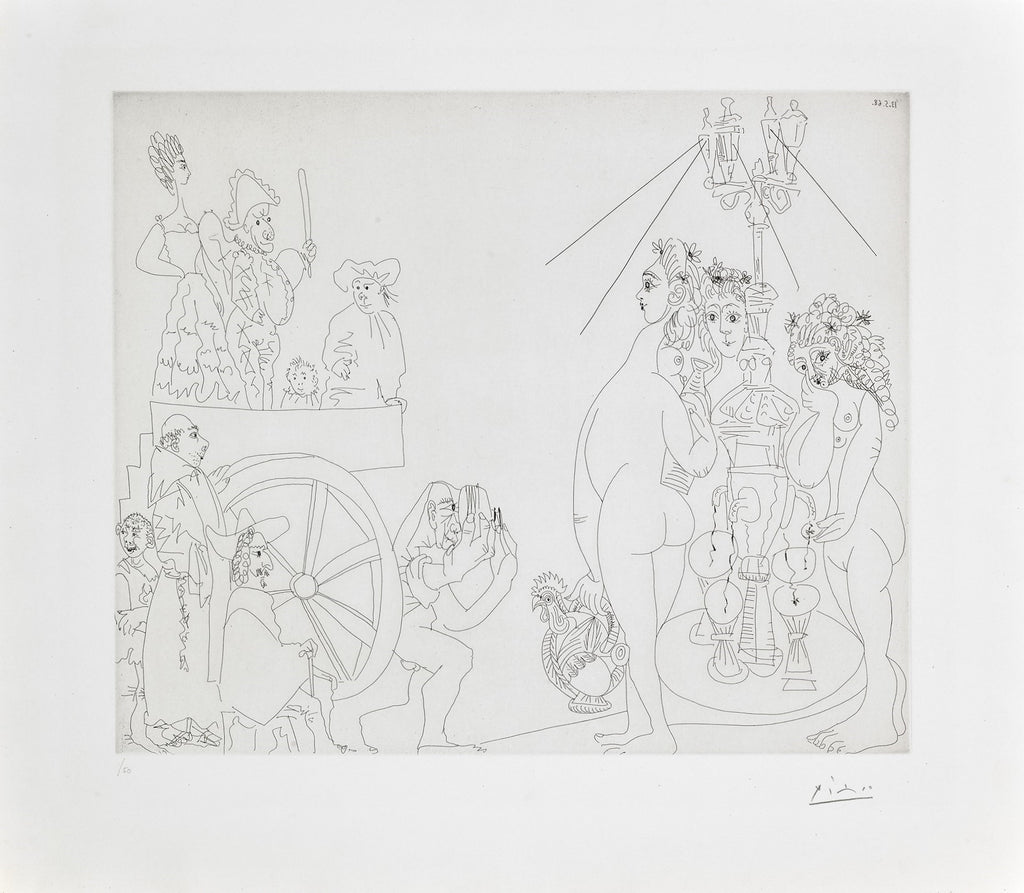Upload a photo of your space
For best results we recommend marking 10 inches on your wall with tape to get a sense of scale. Make sure to have the floor visible in the photo.








About the Work
"Picasso at the Fountain of Canaletas (B.1561)" is an etching by Pablo Picasso from his renowned 347 Series. The image size is 16.25 x 19.5" and the framed dimensions are 28.25 x 31". From the edition of 68, the art is signed 'Picasso' lower right and is framed in a custom, Spanish-style frame. The artwork ships framed and is accompanied by a certificate of authenticity.
In printmaking, the 347 Series was the undertaking which defined late Picasso. This prodigious outpouring of work, dating from March 16th–October 5th, 1968, deals with all of his old themes and fantasies, adding an obsession newly central in the late sixties, the artist as voyeur. It is in this role, rather than that of a protagonist, that the artist figures in these fantastic narration's. The series has been described as taking the form of a stream-of-consciousness epic. There is a suggestion of narratives throughout the series; however, there is never a point where a story comes to completion or where suggested desire is realized. There are faces we know, tales we have seen, and the work of great masters is recognizably revisited, but all without a clear endpoint. These prints become instead a stroll through the mind and memories at the end of Picasso’s much-lived life. A note about the technical production of these plates - to work with full freedom and concentration, Picasso had his printers, the brothers Crommelynck, bring the etching plates and hand press to his farmhouse near Cannes.
About the Artist
Pablo Ruiz Picasso was born on October 26, 1881, in Malaga, Spain. His father was a professor in the School of Arts and Crafts and often took him to bullfights which would influence much of his art throughout his career. It is said that Picasso learned to draw before he could speak. Picasso studied the works and styles of many Spanish artists including Francisco Goya, El Greco, and Diego Velázquez. At the beginning of the 1900s, Picasso moved to Paris, France to open his own studio. He was lonely and depressed after the death of a close friend, which ignited what is now known as his “Blue Period”. A few years later, Picasso started the “Rose Period”, which introduced warmer colors to his works. Picasso is commonly known as the pioneer of Cubism, in which objects are broken apart and reassembled in an abstracted form; it is destructive and creative. Cubism shocked, appalled and fascinated the art world.
Please utilize the AR experience in a well-lit room.
Scan the room for surface detection.

Artwork will place in your room.
Using your fingers, align the horizontal white line
with your floor.

Double tap the artwork to scale to 100% size
and pinch to move on the screen.










